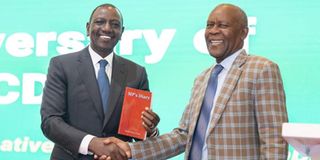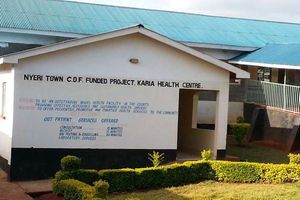
Former Ol Kalou MP Muriuki Karue with President William Ruto during the 20th anniversary of the National Government Constituencies Development Fund (NG-CDF) in Nairobi.
When Engineer Muriuki Karue was elected Ol Kalou MP in 1997, he says he encountered numerous obstacles at the National Assembly trying to push for a development agenda, particularly the common ministerial response "it will be done when funds are available."
This phrase, he says, highlighted the limitations of resource allocation and inspired the then newly elected Karue to devise a solution.
Born in Nyeri’s Mathira Constituency, Mr Karue moved to Nairobi and later to Nyandarua, where he was elected MP for Ol Kalou on a Democratic Party (DP) ticket. By then, Ol Kalou was inclusive of the current Ol Joro Orok Constituency, making it one of the largest in the entire Central Province.
He faced the harsh realities of Nyandarua's underdevelopment, including poor infrastructure and inadequate educational and health facilities.
“I had moved to Nyandarua where there were no roads, and accessing my home about nine kilometres from the Nyahururu-Gilgil Highway was a problem when it rained,” Mr Karue tells the Nation in an interview.
In a deplorable state
Many schools in the area were in a deplorable state, with most being mud-walled and lacking basic facilities.
Mr Karue says he collaborated with local leaders and residents to identify the constituency's needs, which led to the creation of a comprehensive wish list- especially in the health, education and infrastructure sectors.
However, repeated deferrals by ministers prompted Mr Karue to scrutinise the Constitution and the government's budgetary processes and he realised the need for a dedicated fund for grassroots projects.
“It was so unfortunate. The ministers were fellow MPs at the time and we used to have what we called question time, a one-hour session in every sitting. This session was important for every MP as it was the only opportunity to ask questions, lobby and get answers which could get things rolling,” explains the former MP.
Among the first questions, he asked the then Health minister to tell the House was when the government would build health centres in his constituency’s 10 wards.
The former legislator says the minister’s usual response irritated him.
“He said you cannot do the nine health centres at ago. Mr Speaker, what the Member for Ol Kalou wants, the government will build the health centre, we shall equip it, we shall staff it, and we shall operationalise it when funds become available..."
Health centre
“And when I was asking for a health centre, another MP was asking for a different project, maybe a bridge, the other one asking for a police post depending on individual constituency needs and priorities. But the government will never say no to any development, only when funds become available. That phrase from ministers became an irritating tune,” says Mr Karue.
In the Eighth Parliament, Mr Karue proposed a Motion to allocate five per cent of government revenue to grassroots projects.
This motion led to the drafting and eventual passing of the Constituency Development Fund (CDF) Bill, though it was a lengthy process according to the former legislator.
“There were many bureaucracies then and things moved slowly in Parliament those years. It took between 2000 when I drafted the Bill and 2004 when the first fund was disbursed,” he says.
The fund was initiated through the now-repealed CDF Act of 2003 that came into effect on April 15, 2004, marking a significant milestone in Kenyan politics. The CDF allowed MPs to address immediate community needs without waiting for centralised government approval.
Mr Karue's vision transformed many communities.
He witnessed first-hand the stark improvements in educational facilities and infrastructure, recalling a visit to a school in Mandera, where classes were held under Acacia trees as pupils sat on logs in the scorching sun.
“These were the things that the CDF came to salvage. The fund provided desks, built classrooms and improved school infrastructure, significantly impacting education in underprivileged areas. There are places where children never went to school not because they never wanted to, but because there was no school to go to. I must also inform you that before the CDF Bill in the year 2000, the year before I had drafted the KERRA Bill which was my first agenda when I went to Parliament because what was most critical in Ol Kalou Constituency was ensuring Nyandarua had good roads, that is where the CDF concept came,” he says.
In Ol Kalou, Mr Karue's tenure as the CDF committee chairperson involved establishing clear management structures.
Initially centred on MPs, the management has now shifted to a CDF board to ensure fair and effective utilisation of funds.
In his time, his committee felt it was unfair for the fund to revolve around an MP, making all decisions. This led to an amendment creating the office of the CDF board member at the constituency level as the fund manager.
“I am aware that politicians overwhelm people and give directions on what to do or fund, but the law does not allow that. They just have a leeway for that, but it should not be the case. The way we used to do it when it started was that the law required the MP to call public participation at the ward level for the residents to give priorities, the residents were to identify both short and long-term projects they need, not for the MP..."
Fund Manager
“In the case of a bursary, let no one be lied to, they are awarded by the MP, it's not their business and the law does not allow an MP to sit in an office and decide who is to benefit. The community is better placed to know which child is needy, and the implementation is done by the CDF bursary committee under the Fund Manager,” says Mr Karue.
The CDF has since evolved to become the National Government Constituencies Development Fund (NG-CDF), distinguishing national and county responsibilities.
Mr Karue expresses concern over corruption and misuse of CDF arguing the Ethics and Anti-Corruption Commission (EACC) and the Directorate of Criminal Investigations (DCI) to prioritise such cases.
He also advocates that CDF allocation be raised to five per cent of national revenue, underscoring its crucial role in grassroots development.
“I don’t have the facts about misuse and corruption in the NG-CDF but I am pained when I read in the media about wanton waste and corruption in the CDF,” he laments.
The former Nyandarua senator calls on current MPs to ensure prudent usage of CDF funds and reminds them of the original purpose of the funds to address immediate, small-scale community needs effectively.
He also recalls that before devolution, there were minimal cases of corruption and wastage in CDF since the funds were managed by the District Development Officers, who were the accounting officers in all constituencies within their districts.
“President William Ruto two weeks ago led in celebrating the 20th anniversary of the kitty, and we all learnt that the five per cent for administrative and recurrent expenditure still stands. I don’t understand why we hear about spending beyond that,” he says.
On fair distribution, the former MP says that his committee had set a ceiling of 75 per cent of the funds to be distributed equally in all constituencies, while the 25 per cent was to be allocated to address other inequalities including population-addressing the contentious issue of one-man-one shilling.
The main purpose of the fund is to address the socio-economic development of the people at the constituency level, to reduce poverty and enhance regional equity.
The NG-CDF Act 2015 aligned the operations of the Fund to the new constitutional dispensation, especially in ensuring that the law strongly embraces the principles of participation of the people, separation of powers and delineation of functions between National and County governments.
According to NG-CDF Board Chairperson Yussuf Mbuno, the fund has been allocated Sh522 billion in the last 20 years.






